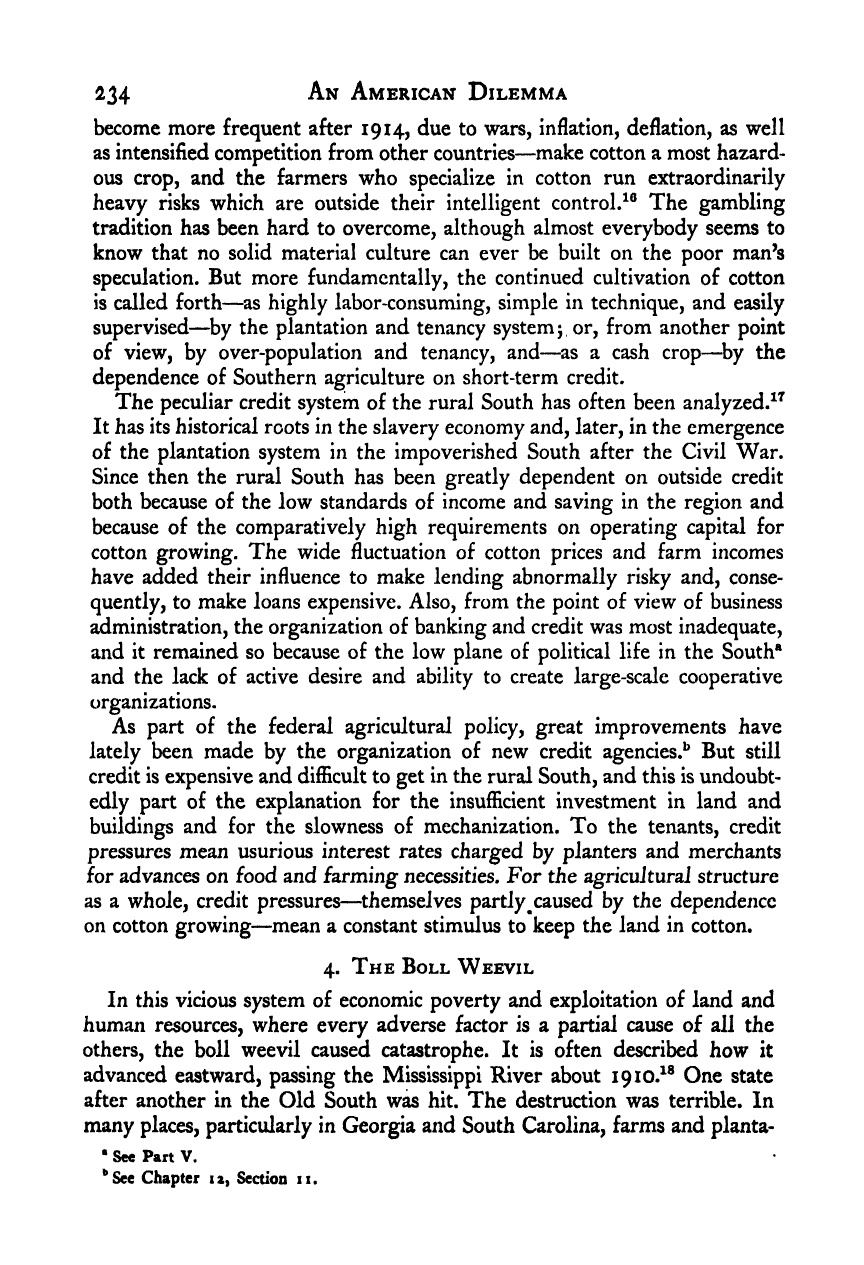Note: Gunnar Myrdal died in 1987, less than 70 years ago. Therefore, this work is protected by copyright, restricting your legal rights to reproduce it. However, you are welcome to view it on screen, as you do now. Read more about copyright.
Full resolution (TIFF) - On this page / på denna sida - IV. Economics - 11. The Southern Plantation Economy and the Negro Farmer - 3. Tenancy, Credit and Cotton - 4. The Boll Weevil

<< prev. page << föreg. sida << >> nästa sida >> next page >>
Below is the raw OCR text
from the above scanned image.
Do you see an error? Proofread the page now!
Här nedan syns maskintolkade texten från faksimilbilden ovan.
Ser du något fel? Korrekturläs sidan nu!
This page has never been proofread. / Denna sida har aldrig korrekturlästs.
234 An American Dilemma
become more frequent after 1914, due to wars, inflation, deflation, as well
as intensified competition from other countries—make cotton a most hazard-
ous crop, and the farmers who specialize in cotton run extraordinarily
heavy risks which are outside their intelligent control.^® The gambling
tradition has been hard to overcome, although almost everybody seems to
know that no solid material culture can ever be built on the poor man’s
speculation. But more fundamentally, the continued cultivation of cotton
is called forth—as highly labor-consuming, simple in technique, and easily
supervised—^by the plantation and tenancy system j
or, from another point
of view, by over-population and tenancy, and—as a cash crop—^by the
dependence of Southern agriculture on short-term credit.
The peculiar credit system of the rural South has often been analyzed.^^
It has its historical roots in the slavery economy and, later, in the emergence
of the plantation system in the impoverished South after the Civil War.
Since then the rural South has been greatly dependent on outside credit
both because of the low standards of income and saving in the region and
because of the comparatively high requirements on operating capital for
cotton growing. The wide fluctuation of cotton prices and farm incomes
have added their influence to make lending abnormally risky and, conse-
quently, to make loans expensive. Also, from the point of view of business
administration, the organization of banking and credit was most inadequate,
and it remained so because of the low plane of political life in the South®
and the lack of active desire and ability to create large-scale cooperative
organizations.
As part of the federal agricultural policy, great improvements have
lately been made by the organization of new credit agencies.*’ But still
credit is expensive and difficult to get in the rural South, and this is undoubt-
edly part of the explanation for the insufficient investment in land and
buildings and for the slowness of mechanization. To the tenants, credit
pressures mean usurious interest rates charged by planters and merchants
for advances on food and farming necessities. For the agricultural structure
as a whole, credit pressures—themselves partly^caused by the dependence
on cotton growing—mean a constant stimulus to keep the land in cotton.
4. The Boll Weevil
In this vicious system of economic poverty and exploitation of land and
human resources, where every adverse factor is a partial cause of all the
others, the boll weevil caused catastrophe. It is often described how it
advanced eastward, passing the Mississippi River about 1910.^® One state
after another in the Old South was hit. The destruction was terrible. In
many places, particularly in Georgia and South Carolina, farms and planta-
• S€« Part V.
’*See Chapter la, Section 11 .
<< prev. page << föreg. sida << >> nästa sida >> next page >>